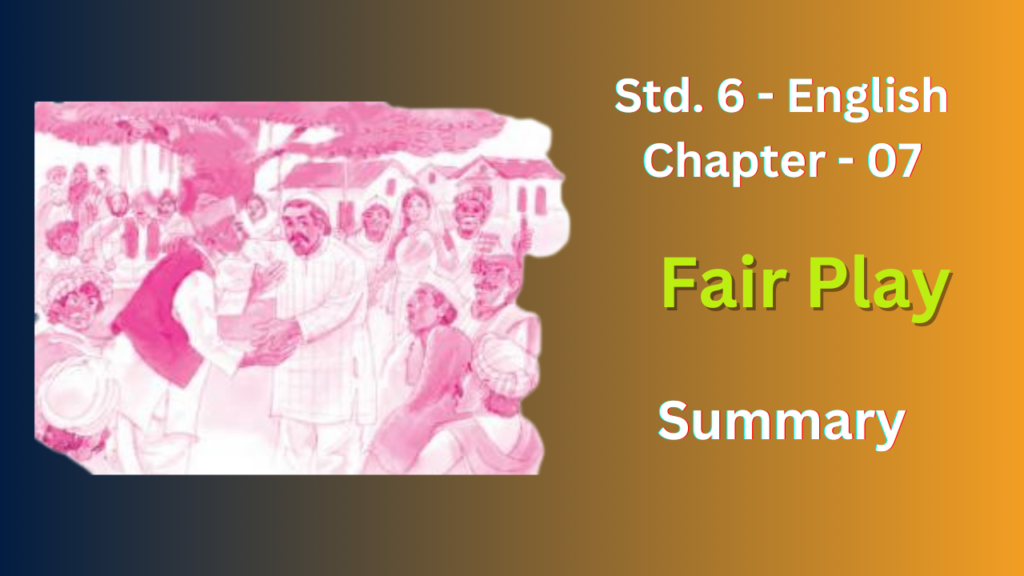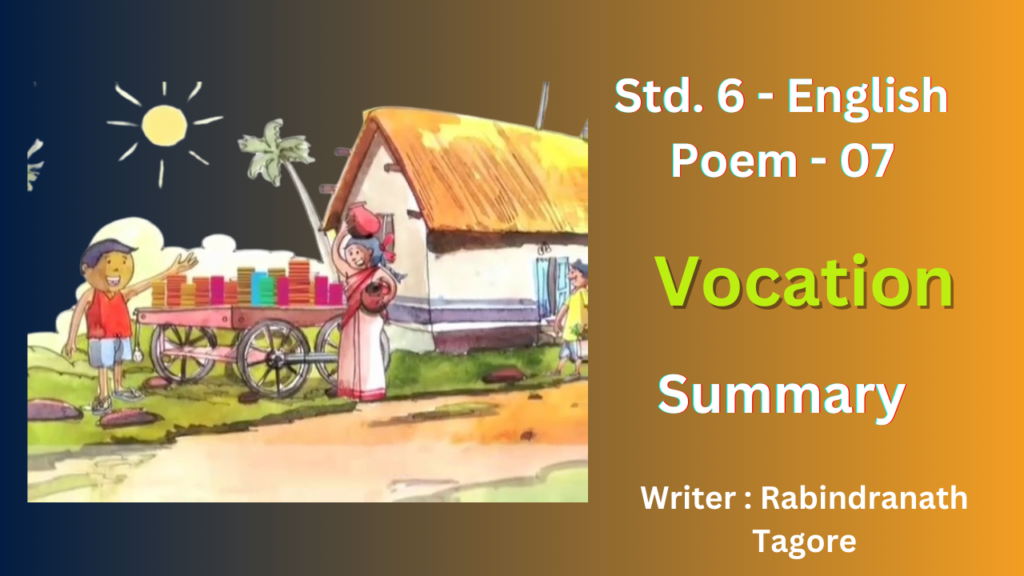NCERT Solutions for Class 6th English Chapter 7
Fair Play
Strong Bonds and a Promise:
The story fair play opens in a village where Jumman Shaikh and Algu Chaudhary are known for their unwavering friendship and the support they offer each other’s families. This sense of loyalty extends to Jumman’s elderly aunt, who decides to transfer ownership of her property to him. In return, Jumman promises to care for her and ensure her well-being throughout her remaining years. Initially, Jumman adheres to this agreement, and his aunt feels secure and content.
A Shift in Behavior:
However, the narrative takes a turn. After some time, Jumman’s behavior changes. His initial commitment to his aunt’s well-being wanes. He, along with his family, begins to neglect and mistreat her. This unexpected shift in treatment leaves the aunt feeling helpless and alone.
Seeking Justice:
Unable to bear the mistreatment any longer, the aunt musters her courage and seeks help from the village Panchayat. This council of elders, traditionally trusted for resolving disputes fairly, becomes her last hope. Interestingly, the aunt specifically chooses Algu as the head Panch (the leader) for her case.
Friendship Tested:
In the fair play story this selection presents a potential conflict. Algu, despite his deep friendship with Jumman, is known for his unwavering commitment to justice. The situation places their friendship in a difficult position – loyalty versus fairness.
Justice Prevails:
Despite the personal connection, Algu prioritizes a just outcome. He carefully examines the case, listens to all parties involved, and ultimately delivers a verdict in favor of Jumman’s aunt. This verdict ensures she receives the respect and care she deserves.
Facing the Consequences:
Jumman’s initial reaction is one of anger and resentment towards Algu. He feels betrayed by his friend’s decision, which prioritizes the aunt’s well-being over his personal wishes. However, as the story progresses, Jumman has time to reflect. He comes to understand the gravity of his own actions and the importance of keeping his promise.
Reconciliation and a Lasting Lesson:
The realization of his mistake leads Jumman to accept Algu’s verdict. He acknowledges his aunt’s rights and the unfairness of his own actions. This self-reflection allows for reconciliation between Jumman and his friend.
The story concludes by highlighting the strength of true friendship. While the situation tested their bond, Algu and Jumman’s friendship ultimately survives based on their shared values of honesty and justice.
Key Takeaways form The fair play:
- The importance of honoring promises and upholding fairness, even when it’s difficult.
- The ability to stand up for what’s right, even if it creates conflict with loved ones.
- True friendship thrives on a foundation of trust, shared values, and the ability to forgive.

NCERT Solutions for Class 6th English Chapter 7 Fair Play
Working With the Text
A.Match the sentences Column I with Column II.
| Column – I | Column – II |
| 1. Jumman and Algu were the best of friends. | 1. He believed that his friend would never go against him. |
| 2. Jumman’s aunt transferred her property to him | 2. She wanted justice. |
| 3. The aunt decided to appeal to the | 3. In the absence of one, the other took care of his family. |
| 4. Algu was unwilling to support the aunt. | 4. The condition was that he would be responsible for her welfare. |
| 5. Jumman was very happy to hear Algu’s name as’head | 5 .The bond of friendship between him and Jumman was very strong. |
Ans :
| Column – I | Column – II |
| 1. Jumman and Algu were the best of friends. | In the absence of one, the other took care of his family. |
| 2. Jumman’s aunt transferred her property to him | The condition was that he would be responsible for her welfare. |
| 3. The aunt decided to appeal to the | The condition was that he would be responsible for her welfare. |
| 4. Algu was unwilling to support the aunt. | The bond of friendship between him and Jumman was very strong. |
| 5. Jumman was very happy to hear Algu’s name as’head | He believed that his friend would never go against him. |
B. Who says this to whom and why?
1. “My wife knows best how to run the house.”
2. “But is it right, my son, to keep mum and not say what you consider just and fair?”
3. “What have you to say in your defence?”
4. “I can’t pay you a penny for the wretched beast you sold me.”
5. “Victory to the This is justice.”
Ans : “My wife knows best how to run the house.”
- Speaker: Husband
- Listener: This could be directed to anyone, possibly a relative, friend, or even their own children.
- Reason: This statement reveals a traditional view of gender roles. The husband might be trying to avoid responsibility for household decisions or deflect criticism by suggesting his wife has the final say.
- “But is it right, my son, to keep mum and not say what you consider just and fair?”
- Speaker: Parent (likely the father)
- Listener: Son
- Reason: The parent is encouraging their son to speak his mind and stand up for what he believes is right, even if it’s uncomfortable. They are questioning his silence in a situation where fairness might be at stake.
- “What have you to say in your defence?”
- Speaker: Judge (or someone in a position of authority)
- Listener: Defendant in court
- Reason: This is a formal way of asking the defendant to explain their actions or provide justification for their behavior. It’s a prompt for them to offer a defense before a verdict is reached.
- “I can’t pay you a penny for the wretched beast you sold me.”
- Speaker: Angry buyer
- Listener: Seller
- Reason: The buyer is expressing extreme dissatisfaction with the purchase. They believe they were tricked or sold something unusable (“wretched beast”). This statement is a refusal to pay for the item, implying the seller acted unethically.
- “Victory to the Panchayat! This is justice.”
- Speaker: This could be said by a member of the Panchayat (village council), someone observing their decision, or even the winner of a case decided by the Panchayat.
- Reason: This is a celebratory statement acknowledging the Panchayat’s decision. The speaker believes justice has been served in a particular case through the council’s ruling.
C. Answer the following questions.
1. “Then the situation changed.” What is being referred to?
Ans :
- Jumman and his family’s behavior towards his aunt becomes disrespectful and neglectful.
- They start mistreating her and make her life difficult.
2.When Jumman’s aunt realised that she was not welcome in his house, what arrangement did she suggest?
Ans : The story mentions the aunt requesting a monthly allowance from Jumman.
Why This Implies a Separate Arrangement:
- By requesting money, the aunt suggests she can no longer rely on Jumman’s household to meet her basic needs.
- This allowance could be used to:
- Secure separate accommodation.
- Hire help for daily tasks.
- Purchase food and necessities.
3. What was the villagers’ reaction when the aunt explained her case to them?(4)
Ans :
- Sympathy: The aunt’s mistreatment by Jumman likely evokes sympathy from the villagers. They might have known her previously as a respected member of the community. Seeing her vulnerable state could trigger feelings of compassion.
- Indignation: The villagers might feel a sense of indignation at Jumman’s behavior. Breaking a promise to care for an elder is likely viewed negatively in a traditional village setting.
- Support: It’s likely the villagers offer emotional or practical support to the aunt. They might encourage her to seek justice through the Panchayat, highlighting the council’s role in resolving such disputes.
4. Why was Jumman happy over Algu’s nomination as head Panch?
Ans : Jumman likely wasn’t happy about Algu being head Panch. He might have hoped Algu’s friendship would influence the case in his favor, but Algu’s reputation for fairness suggests the judgment would be based on evidence, not personal ties.
5. “God lives in the heart of the Panch”, the aunt said. What did she mean?
Ans : In “Fair Play,” when the aunt says “God lives in the heart of the Panch,” she’s expressing her faith in the Panchayat system and the head Panch’s ability to deliver a just verdict.
6. What was Algu’s verdict as head Panch? How did Jumman take it?
Ans :
- The Verdict: Algu ruled that Jumman had to fulfill his responsibility towards his aunt. This likely involved providing for her basic needs, possibly through a monthly allowance.
- Jumman’s Reaction: The text suggests Jumman was initially angry and upset with Algu’s decision. He might have felt betrayed by his best friend who didn’t favor him despite their close bond.
7. Algu found himself in a tight spot. What was his problem? (9)
Ans : Algu’s problem is a clash between friendship and duty. As head Panch, he must deliver a fair verdict, but fairness might mean going against his best friend Jumman.
8. Why was Algu upset over Jumman’s nomination as head Panch? (12, 13)
Ans : The story suggests Jumman likely wasn’t happy about Algu being head Panch, not the other way around. Jumman might have hoped Algu’s friendship would influence the case in his favor, but Algu’s role demands a fair judgment based on evidence, not personal ties.
9. What was Jumman’s verdict as head Panch? How did Algu take it? (14, 15)
Ans :
Jumman’s verdict as head Panch:
The story doesn’t explicitly mention Jumman judging a case involving Algu. The focus is on Jumman’s aunt’s case where he, as head Panch, likely ruled in favor of his aunt, requiring him to provide for her.
Algu’s reaction:
Since Algu wasn’t involved in a case judged by Jumman, the question about Algu’s reaction doesn’t apply here.
10. Which of the following sums up the story best?
(i)“I also know that you will not kill your conscience for the sake of friendship.”
(ii)“Let no one deviate from the path of justice and truth for friendship or en- , mity.”
(iii)‘The voice of the Panch is the voice of God.”
Give a reason for your choice.
Ans : Out of the options, “(ii) “Let no one deviate from the path of justice and truth for friendship or enmity.”” best reflects the story. This quote directly highlights the struggle between friendship and prioritizing justice, a central conflict in “Fair Play.
Working with Language
A. Replace the italicised portion of each sentence below with a suitable phrase from the box. Make necessary changes, wherever required.
look after, swallow, make it up, keep mum, go into, ease one’s conscience , as ill luck would have it, a tight spot, take chances, my heart sank
1. The best way to avoid an unnecessary argument is to remain silent
2. Unfortunately, the train I was trying to catch was cancelled.
3. He has been told not to take risks while driving a car through a crowded street.
4. The patient needs to be properly taken care of.
5. Why don’t the two of you end your quarrel by shaking hands?
6. I was in a difficult situation till my friends came to my rescue.
7. When I saw a pile of dirty dishes, I felt very disappointed.
8. I will examine the matter carefully before commenting on it.
9. They criticised him in the meeting but he accepted without protest all the criticism.
10. It will free me from worry to know that I had done nothing wrong.
Ans :
- The best way to avoid an unnecessary argument is to keep mum.
- Unfortunately, the train I was trying to catch was cancelled.
- He has been told not to take chances while driving a car through a crowded street.
- The patient needs to be properly looked after.
- Why don’t the two of you end your quarrel by shaking hands?
- I was in a tight spot till my friends came to my rescue.
- When I saw a pile of dirty dishes, my heart sank.
- I will examine the matter carefully before going into it.
- They criticized him in the meeting, but he swallowed all the criticism without protest.
- It will ease my conscience to know that I had done nothing wrong.
B. Look at the following phrases and their meanings. Use the phrases to fill in the blanks in the sentences given below.
set up — put in place or start
set aside — save or keep for a particular purpose
set down — write or record
set out — start on a journey
set in _ begin and seem likely to continue
- Why don’t you________________ your ideas on paper?
- A fund has been_________________ for the soldiers’ families.
- We should________________ a little money every month.
- You should buy some woollens before winter___________________
- They______________ on the last stage of their journey.
Ans :
- Why don’t you set down your ideas on paper?
- A fund has been set aside for the soldiers’ families.
- We should set aside a little money every month.
- You should buy some woollens before winter sets in.
- They set out on the last stage of their journey.
NCERT Solutions for Class 6th English Chapter 7 poem – Vocation
Poem – Vocation
The poem “Vocation” by Rabindranath Tagore explores a child’s yearning for freedom and a life beyond their current routine.
The Speaker:
The speaker is a young school child who observes various adults during their daily routines.
Observations and Wishes:
- Hawker: The child sees a hawker selling bangles and admires their ability to roam freely and set their own schedule.
- Gardener: They observe a gardener digging the ground and working outdoors, a stark contrast to their confined school environment.
- Watchman: At night, they see a watchman patrolling with a lantern, another symbol of independence and staying up later than bedtime.
The Child’s Longing:
The child expresses a desire to be each of these characters, highlighting their attraction to a life with:
- Freedom of movement: Unlike their structured school schedule, they envision roaming freely or working outdoors.
- Independence: The adults seem to have control over their work and time, unlike the limitations of a child.
- Novelty: Each profession offers a unique experience compared to the child’s daily routine.

NCERT Solutions for Class 6th English Chapter 7 poem Vocation
Working With The Poem
1. Your partner and you may now be able to answer these questions.
(i) Who is the speaker in the poem? Who are the people the speaker meets?What are they doing?
Ans : The speaker in the poem is most likely a school-going child. Here’s a breakdown of the people they meet and their activities:
- Hawker: Selling bangles (“crystals bangles”) while calling out to attract customers.
- Gardener: Digging the ground, possibly working in a garden or field. (This activity might happen on the way home from school).
- Watchman: Walking up and down, likely patrolling an area at night. (This might be seen from the child’s window after bedtime).
(ii) What wishes does the child in the poem make? Why does the child want to be a hawker, a gardener, or a watchman? Pick out the lines in each stanza which tell us this.
Ans :
Hawker:
- Lines: “I sometimes wish I were a hawker man, / And roam the streets and cry my wares.”
Why: The hawker’s mobility and independence are attractive. The child imagines walking around freely, calling out to customers, unlike the confined routine of school.
Gardener:
- Lines: “I sometimes think I’d like to be / A gardener under the shady tree.”
Why: The gardener seems to work outdoors in a peaceful environment, under a shady tree. This contrasts with the potentially restrictive nature of a classroom.
Watchman:
- Lines: “Or walk the streets through the still night, / A watchman with his lantern bright.”
Why: The watchman operates at night, a time when the child might feel restricted to their home. The lantern suggests a sense of responsibility and staying awake at a different time than usual.
(iii) From the way the child envies the hawker, the gardener and the watchman, we can guess that there are many things the child has to do, or must not do. Make a list of the do’s and don’ts that the child doesn’t like. The first line is done for you.
The child must
get his clothes dirty in the dust.
………………….
…………………..
The child must not
come home at a fixed time.
……………………….
………………………..
Now add to the list your own complaints about the things you have to do, or must not do.
Ans :
The Child Must:
- Get dressed neatly (opposing the hawker’s potentially messy job).
- Follow a set schedule for meals and snacks.
- Be quiet and well-behaved in certain places (like a library).
- Attend classes and participate in school activities.
- Help with chores around the house.
The Child Must Not:
- Talk back to elders or teachers.
- Play outside unsupervised (especially at night, contrasting the watchman’s freedom).
- Eat sweets or snacks whenever they want.
- Stay up too late at night (as suggested by the envy of the watchman’s nighttime activity).
- Miss school unless they’re truly sick.
(iv) Like the child in the poem, you perhaps have your own, wishes for yourself. Talk to your friend, using “I wish I were…”
Ans :
I wish I were a travel blogger. Imagine exploring new places all the time, trying different foods, and meeting interesting people. It would be amazing to document those experiences and share them with the world.
But then again, maybe being a marine biologist would be cooler! Diving into coral reefs, discovering new species, and learning about the secrets of the ocean – that sounds pretty incredible too.
FAQ’S
What is the significance of “Fair Play” in NCERT Solutions for Class 6th English Chapter 7?
“Fair Play” explores themes of sportsmanship, integrity, and ethical behavior, making it an essential component of the Class 6 English curriculum.
How does “Vocation” contribute to career exploration in NCERT Solutions for Class 6th English Chapter 7?
“Vocation” introduces students to the concept of career exploration, helping them identify their interests, skills, and aspirations as they begin to explore future career paths.
What lessons can students learn from “Fair Play” and “Vocation” in NCERT Solutions for Class 6th English Chapter 7?
Through “Fair Play,” students can understand the importance of honesty, teamwork, and respect in sports and everyday life, while “Vocation” teaches the significance of exploring one’s passions and interests to pursue a fulfilling career.
How do “Fair Play” and “Vocation” foster character development in students?
Both texts promote values such as integrity, perseverance, and self-awareness, fostering character development and helping students cultivate essential life skills for success in both personal and professional realms.
Are there any real-life examples or experiences that resonate with the themes of “Fair Play” and “Vocation”?
Students may relate their experiences of demonstrating fair play in sports or extracurricular activities, as well as their reflections on exploring potential career paths and aspirations, reflecting the themes explored in these texts.


